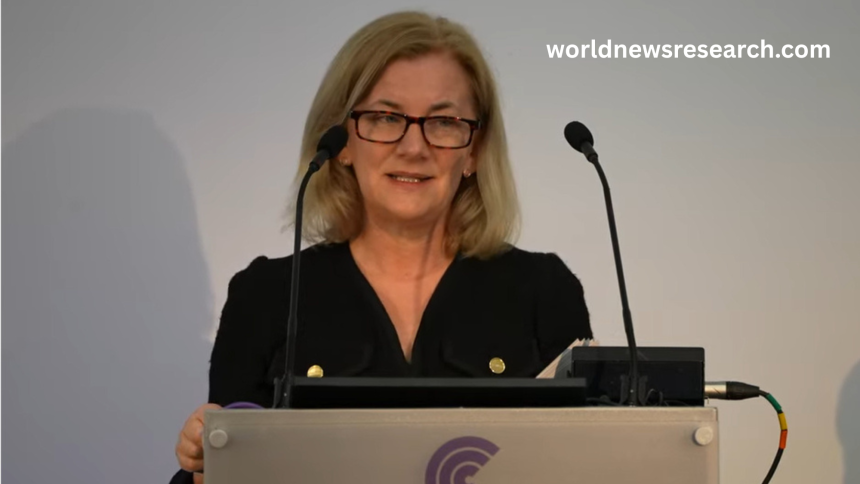Emily Shepperd has stepped down from her leadership position at the Financial Conduct Authority (FCA), marking the end of a remarkable and reform-driven chapter for one of the UK’s most significant regulatory institutions. Her departure comes after a tenure characterized by bold strategic changes, cultural transformation, and enhanced focus on innovation and accountability in the financial sector.
Shepperd leaves behind a reputation as a forward-thinking, operationally skilled, and principled leader. She played a critical role in modernizing the FCA during a pivotal time, steering it through challenges brought by global uncertainty, technological disruption, and an ever-changing regulatory environment.
A Leader Shaped by Experience
Before her arrival at the FCA, Shepperd had built a diverse and accomplished career in financial services. Her background in high-level roles at global firms provided her with an invaluable understanding of operations, compliance, and the customer experience. She worked in institutions ranging from global banks to investment houses, holding senior roles in operations, technology, and client services. This broad experience offered her a unique lens on the industry—one grounded in both risk management and strategic growth.
Her professional journey was not limited to corporate achievements. Those who worked with her often cite her combination of technical competence and emotional intelligence as key assets. She was known for her ability to lead teams through significant change, drive clarity in complex structures, and foster a culture of continuous improvement.
Transforming the FCA’s Authorisations Division
When Shepperd joined the FCA, one of her earliest tasks was to take charge of the Authorisations division. At the time, this department was under considerable pressure. The volume of pending applications had grown considerably, creating frustration for firms seeking approval to conduct regulated activities. Industry leaders raised concerns about the lag in application processing times, with some suggesting the delays were hurting innovation and competitiveness in the UK’s financial landscape.
Shepperd responded by leading a thorough overhaul of the division’s structure and operations. She implemented leaner processes, integrated digital workflows, and expanded the training provided to staff. Her focus was not just on efficiency but on transparency and accountability. Under her guidance, the FCA improved both the speed and quality of its decision-making, dramatically reducing application backlogs.
Colleagues recall her approach as both methodical and empathetic. She made it a priority to understand the pain points within the team and consulted widely across internal departments and external stakeholders. This collaborative style helped to rebuild trust with the financial services industry while reinforcing the FCA’s commitment to high standards.
Elevation to Chief Operating Officer
Following her success in revitalizing the Authorisations unit, Shepperd was promoted to the role of Chief Operating Officer (COO). In this expanded capacity, she oversaw not only operational delivery but also internal strategy, financial performance, human resources, communications, and digital transformation efforts. The role demanded a high level of coordination across the organization and a vision for the FCA’s long-term development.
One of her hallmark contributions as COO was leading the design and launch of a multi-year strategic roadmap. The plan articulated key priorities for the FCA, including stronger consumer protections, improved resilience in financial markets, and greater support for responsible innovation. Her vision was grounded in pragmatism—recognizing that regulation must keep pace with a rapidly evolving ecosystem of products, services, and risks.
Shepperd was a vocal advocate for ensuring that internal processes at the FCA mirrored the standards it set for regulated firms. She championed investments in digital infrastructure, the adoption of advanced analytics, and a restructuring of legacy systems. The goal, she often explained, was not just to react to problems but to become an agile, data-driven organization capable of proactive intervention.
Driving Culture Change
Throughout her time at the FCA, Shepperd consistently emphasized the importance of culture in driving good outcomes. In speeches, interviews, and internal communications, she made it clear that culture is not a soft or secondary concern—but the very foundation of ethical decision-making and long-term success in any financial firm.
Her belief was that culture is contagious, spreading quickly through teams and influencing behavior at every level. Whether good or bad, it shapes how institutions respond to pressure, handle mistakes, and treat customers. This insight informed the FCA’s increasing focus on cultural audits and supervision—not just checking compliance boxes, but assessing tone from the top, middle management accountability, and staff engagement.
Her tenure saw a new level of regulatory attention on non-financial misconduct, including issues related to workplace behavior, diversity, and inclusion. Shepperd strongly supported efforts to hold senior leaders to account for the broader environments they created within their firms. At public forums, she spoke candidly about the need for the financial industry to reflect society, earn trust, and serve people—not just profits.
Embracing Innovation
Shepperd also brought a keen awareness of the opportunities and challenges created by financial technology. Under her leadership, the FCA began to more actively support responsible innovation, both through internal capabilities and external engagement.
One major initiative was the expansion of the regulator’s Innovation Hub, which offered support to firms developing cutting-edge tools in areas like artificial intelligence, blockchain, and data science. She saw technology as a double-edged sword—capable of delivering transformative value to consumers, but also introducing complex risks that demanded new supervisory models.
She also advocated for the establishment of a dedicated Artificial Intelligence Lab within the FCA. This initiative was not just about experimentation, but about preparing the regulator to understand, evaluate, and respond to algorithmic decision-making systems used by firms. Her philosophy was clear: the regulator must be as technologically sophisticated as those it oversees.
Sustainable finance was another area where Shepperd helped the FCA take a leading role. She supported the introduction of clearer disclosure requirements, anti-greenwashing guidance, and investment labeling frameworks. These measures were designed to promote transparency, prevent misleading claims, and enable consumers to make informed choices about where their money goes.
A Measured Exit and Future Possibilities
News of Shepperd’s departure came as a surprise to some, though others had speculated that she might seek a return to the private sector. In her farewell remarks, she expressed pride in the work accomplished during her tenure and gratitude to her colleagues across the organization.
Shepperd has not publicly disclosed her next steps, but many within the financial services industry expect her to take on a senior role in a major institution, or perhaps launch an advisory practice focused on regulatory strategy and transformation. Given her reputation and track record, there is little doubt that she will remain an influential voice in the sector.
The FCA has not yet announced a permanent replacement for her role. In the meantime, the existing executive team is expected to maintain the strategic momentum she initiated, continuing the implementation of operational reforms and regulatory modernization programs.
Legacy and Reflections
Emily Shepperd’s legacy at the FCA is one of professionalism, progress, and principled leadership. She helped to shift the organization’s internal mindset, challenged outdated assumptions, and placed the regulator on firmer footing to deal with the future.
Under her watch, the FCA became faster, more transparent, and more focused on culture as a core element of regulation. She treated culture not as an abstract concept, but as something that could—and should—be managed, measured, and improved. She believed that strong institutions require strong foundations, and she worked tirelessly to build those from the inside out.
While the industry continues to evolve, much of the groundwork Shepperd laid is expected to benefit the FCA for years to come. Her impact is likely to be felt not only within the regulator itself but across the broader financial system, as firms respond to the higher standards she helped promote.
As one former colleague put it, Shepperd brought “a calm hand, a sharp eye, and a clear voice” to the FCA at a time when all three were badly needed.
In an era of constant disruption, her tenure serves as a reminder that thoughtful, mission-driven leadership can still drive meaningful change. And as she moves on to new challenges, the sector will be watching closely to see where her next influence will be felt.
Frequently Asked Questions
Who is Emily Shepperd?
Emily Shepperd is a former executive at the Financial Conduct Authority (FCA), where she served in leadership roles including Executive Director for Authorisations and Chief Operating Officer. She is known for driving strategic and cultural change within the organization.
What roles did she hold at the FCA?
Shepperd initially joined as Executive Director for Authorisations and was later promoted to Chief Operating Officer. In these roles, she was responsible for operational strategy, regulatory processing, technology upgrades, and internal culture reform.
Why did Emily Shepperd leave the FCA?
Shepperd announced her departure after completing a transformative period at the FCA. While she did not publicly cite specific reasons, it is understood she intends to return to the private sector. Her exit marks the end of a major internal modernization effort she helped lead.
What changes did she bring to the FCA?
Shepperd led the overhaul of the authorisations process to reduce delays and improve efficiency. She introduced technology enhancements, championed a focus on healthy organizational culture, promoted sustainable finance, and supported regulatory adaptation to new technologies such as artificial intelligence.
How was she viewed within the financial industry?
Emily Shepperd was widely respected as a modern and pragmatic leader. Her approach combined operational rigor with a clear ethical stance. Many in the financial sector saw her as a driving force for credible and balanced regulation.
What is her legacy at the FCA?
Her legacy includes significant operational improvements, a stronger cultural framework within the regulator, enhanced regulatory responsiveness, and progress toward embracing innovation. She helped reposition the FCA as a proactive and reform-minded institution.
Who is replacing her at the FCA?
As of her departure, the FCA had not named a permanent successor. The existing executive leadership team is managing her responsibilities during the transition.
Is Emily Shepperd joining another organization?
At the time of her departure, Shepperd had not publicly confirmed her next professional move. However, there is broad speculation that she may take up a senior role in a financial institution or advisory capacity.
Conclusion
Emily Shepperd’s time at the FCA was marked by a rare combination of clarity, compassion, and resolve. As both a strategist and a reformer, she played a pivotal role in guiding the organization through a period of significant internal and external transformation.





